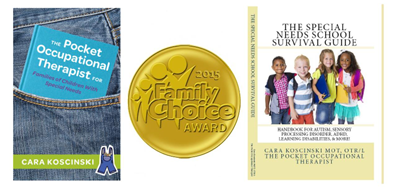10 Tips for Children with Feeding Difficulties
03.15.2015
So as to educate others with excellent strategies to help children with feeding difficulties, Tools to Grow is extremely honored to have Cara Koscinski, MOT, OTR/L as our second guest blogger. Cara Koscinski has a Master's degree in Occupational Therapy and has over 17 years of experience. She specializes in working with children who have autism, Sensory Processing Disorder (SPD), ADHD, learning disabilities, and special needs. Cara frequently speaks about autism and pediatric topics across the US. She teaches courses to train therapists, teachers, parents, and other professionals. Cara is a parent to children with special needs. Please view Ms. Koscinski’s entire biography at the conclusion of the blog.

While you consider the upcoming tips, remember that NO ONE is perfect! As the parent of two picky eaters who have Sensory Processing difficulty, mealtimes are one of the most stressful and overwhelming parts of my day. You are not alone and support can be found in groups on social media, through your child’s therapist, or the pediatrician’s office. Having the support and understanding of another parent who has true empathy can mean the difference between success and stress. The most important thing is to try to have fun during mealtimes and involve your child in the food choices and dinner menus. You and your family can create happy memories of feeding that will last a lifetime!
1) Encourage children to help with mealtime preparation and shopping. Ask them to help make the weekly menu and take them to the grocery store with you to purchase the ingredients. When children have the choice of which bundle of carrots or picking the broccoli bunch, it gives them more control. Confidence and a sense of pride comes when parents respect a child’s choice –even one as small as assisting with shopping. Remember not to allow kids to make choices such as sugary or junk foods.
2) Let kids do some of the non-dangerous parts of cooking and make it a fun and memorable time. We commonly use utensils found in our Play-dough kit or in the pretend kitchen. Plates included in the tea set or doll-house can be used to maintain the element of fun and creativity. Including your child’s teddy bear or doll in the preparation adds an element of imagination.
3) Use the “one bite” rule. Children should be encouraged to take at least ONE bite of each food on the plate. Don’t push for more bites if the child does not want them. It takes at least 10-15 trials of one food before we get used to it! Exposing kids to more foods will help them to be more willing to try new things. So, ensure there’s always a new food on the plate along with old favorites.
4) Make sure there’s no pressure during mealtime. Keep meal times short for younger children, especially toddlers who get distracted easily. Permit messes at the table and never force kids to eat everything on their plate. This may cause extra anxiety around mealtime, which will decrease hunger and bring stress to subsequent meals.
5) Consider the temperature and textures of food. Some kids like warm food and others prefer to eat cold items. Try to think about what your child prefers and when trying a new food, keep it at the same temperature he’s used to. For example, my son likes it when his food is cooled down. He will not eat anything unless it’s at room temperature. We want him to eat and not fight us so we present his meals after they are cooled. Remember that you can freeze foods and some veggies may taste crunchy and delicious right out of the freezer! Peas are a great example and they fit little hands perfectly.
6) PLAY with food. Consider holidays and kids’ interests. Make silly faces out of veggies and fruits. Encourage kids to like and bite food as you play to experience different tastes and textures. What’s your child’s favorite game? My son loves Minecraft. We create villagers, zombies, animals and other characters from the game with foods.
7) Use dips. Yogurt, dressing, pureed veggies, and peanut butter are some ideas. Animals can roll around in the “mud” or jump in a puddle of ranch dressing. Do not get upset if kids make a mess, in fact – the messier, the better! Remember that often times, picky eaters do not like messy hands so anytime kids tolerate wet or dirty hands, it’s a great thing.
8) Keep distractions to a minimum. We insist on eating our meals at the table and as a family. Mealtime is an “event” vs. a time to run into the kitchen and eat on the go. TV should be off since there are so many commercials about dessert foods and it’s a distraction. Play relaxing music, such as Mozart OR kid-friendly songs. Playing with food can then include making the food do the “twist” or “hokey-pokey” into your child’s mouth! When mealtimes are low-stress and fun, everyone relaxes. Reduce stress and keep conversation light and fun. Make difficult family decisions later and reserve mealtime for eating and being together.
9) Use fun table cloths and decorations at the table. My kids, even my teenager enjoys a festive table. Pinterest has tons of creative and easy ideas for crafts, placemats, and decorations. We sometimes pretend we are at a “fancy” dinner and lower the lighting and add candles. It’s an awesome way to learn good table manners and add an element of surprise and fun.
10) Set a good example. There are many times I catch myself “grazing” before dinnertime. My children’s eyes are always watching what I do and they often imitate my behavior. Remember that kids need three meals and two healthy snacks. The best way to stop grazing behavior is to set a consistent schedule. On the weekends, we try to eat at the same time as the weekdays to keep my boys on track.
![]()
Cara has successfully started two therapy clinics for children with special needs. Cara is passionate about providing quality treatment to children with special needs! She created The Pocket Occupational Therapist, which provides training and books to help caregivers of kids with special needs. Her CDs, Sound-Eaze and School-Eaze are found in catalogues across the US and are for children who fear loud noises.
Cara has written The Pocket Occupational Therapist for Families of Children With Special Needs and The Special Needs School Survival Guide: Handbook for Autism, Sensory Processing Disorder, ADHD, Learning Disabilities, & More! Both of these books were recent winners of the Family Choice Award for 2015.
Cara Koscinski, MOT, OTR/L
The Pocket Occupational Therapist

Related Topics: Early Intervention , Feeding , Sensory Processing/Self-Regulation, Tools to Grow at Home


